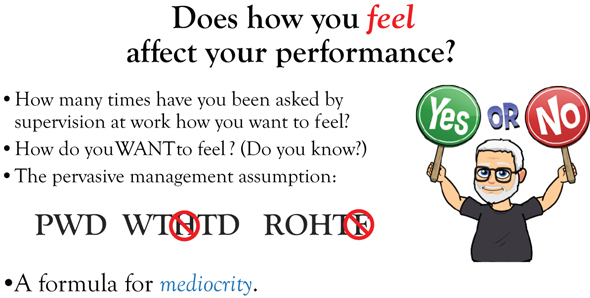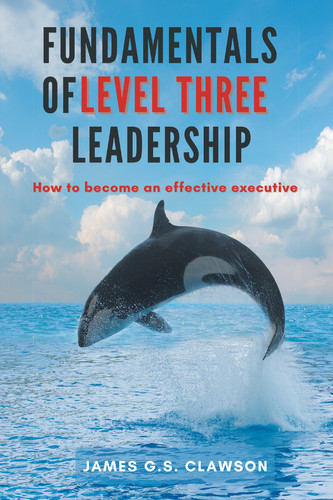Concept
There are a number of common VABEs in the world. A few of them are:
• I am right and you are wrong.
• Parents know what’s best for their children.26
• Parents are responsible for teaching their children.
• Parents have a right to punish their children if they don’t obey.
• My religion is true; yours is false.
• My way of life is better than yours.
• You should do things my way.
And more. Do you recognize any of these VABEs in the people you meet? In yourself?
There is another VABE common in managers worldwide. I have observed this in my consulting around the world. The VABE is
Professionals will do what they have to do regardless of how they feel.
This VABE is, to me, a formula for mediocrity. And it has two major flaws. First, it puts people in an obligatory mindset. And as you read in the chapter on Choice and Obligation, obligation drains energy, motivation, initiative, productivity, and creativity.
The second flaw is that it takes feel or emotion off of the table. See the chapters on Resonance and the relationship between Feel and Performance.
So, if you tell people what to do, tell them to do what they are told, and to leave their emotions at the door, you are basically asking them to be robots. Henry Ford famously once said, “I keep trying to hire a pair of hands and they keep showing up with heads and bodies attached.” He would have preferred robots. And indeed robots have taken over many manufacturing jobs.
When it comes to management, however, robots are not so good at managing people—who have heads, bodies, hands, and hearts.
If you believe this VABE, PWD WTHTD ROHTF, I invite you to think about the consequences of your behavior. Will it generate energetic, passionate, and creative employees? What are your VABEs about how much innovation and creativity and energy you want at each level of your organization?
We begin to teach this VABE to our children when we send them off to school. “I know you don’t want to go, my dear, but it’s time for you to grow up and be a big girl/boy and do what you have to do. I know you don’t want to, but you have to put your feelings aside and go to school. This is what big people do!” When we say things like this, what are we teaching our children?
Example
There are examples of this VABE in virtually every organization I have ever been in. It manifests itself in many companies. Especially those managed by authoritors who manage by the numbers without being among and relating to their employees. It is manifest in companies in which the authoritors do not recognize the importance of organizational culture and how it affects results. The military is another example of where PWD … is widespread. Many government bureaucracies also show a disdain for feel. Organized crime is another place where PWD … dominates.
Diagram

1. Identify the managers in your organization who seem to believe the PWD VABE.
2. How might one engage those managers in a re-examination of that VABE?
3. To what extent do you believe in the PWD … VABE?
4. What would happen if you could let go of this VABE?
26 Glasser, W. 2010. Choice Theory. HarperCollins. (later edition)
